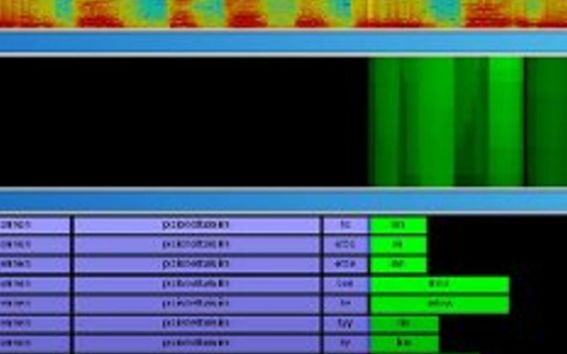Speech recognition
Our goal is to generally improve the speech recognition methodology with the help of the new algorithms developed in Aalto University. Speech recognition offers challenging benchmarking tasks for efficient algorithms that can process and learn to represent large quantities of data. In addition to improving the acoustic models of phonemes we aim at developing new learning statistical language models for difficult large vocabulary continuous speech recognition tasks.

Research Overview
We currently specialize in the following research areas in speech recognition:
- Sub-word units and deep learning in language modeling
- Speaker adaptation and pronunciation rating in acoustic modeling
- Unlimited vocabulary continuous speech recognition
- Speech recognition and language modeling methods for under-resourced languages
- Methods for describing and translating audiovisual
- Speaker and language recognition and diarization
We are part of Finnish Center of Artificial Intelligence (FCAI, https://fcai.fi/).
Teaching
We are teaching the following courses:
ELEC-E5550 Statistical Natural Language Processing
Group members
Software & Demonstrations
Software produced as part of our research is available on our GitHub
Demonstration videos of our research work can be watched on our YouTube Channel
Latest publications
Self-Supervised App-Based Speech Training for Children With Speech Sound Disorder—A Single-Case Experimental Design Study
Sofia Strömbergsson, Ella Edlund, Magdalena Pettersson, Nhan Phan, Mikko Kurimo
2026
International Journal of Language & Communication Disorders
A transformer-based spelling error correction framework for Bangla and resource scarce Indic languages
Mehedi Hasan Bijoy, Nahid Hossain, Salekul Islam, Swakkhar Shatabda
2025
Computer Speech and Language
Multi-Teacher Language-Aware Knowledge Distillation for Multilingual Speech Emotion Recognition
Mehedi Hasan Bijoy, Dejan Porjazovski, Tamás Grósz, Mikko Kurimo
2025
Proceedings of the Interspeech
Is your model big enough? Training and interpreting large-scale monolingual speech foundation models
Yaroslav Getman, Tamás Grósz, Tommi Lehtonen, Mikko Kurimo
2025
Proceedings of the Interspeech
Non-Native Children's Automatic Speech Assessment Challenge (NOCASA)
Yaroslav Getman, Tamás Grósz, Mikko Kurimo, Giampiero Salvi
2025
35th IEEE International Workshop on Machine Learning for Signal Processing
Towards large-scale speech foundation models for a low-resource minority language
Yaroslav Getman, Tamás Grósz, Katri Hiovain-Asikainen, Tommi Lehtonen, Mikko Kurimo
2025
Proceedings of the Joint 25th Nordic Conference on Computational Linguistics and 11th Baltic Conference on Human Language Technologies
Developing a digital tool for L2 speaking assessment in low-resourced languages
Raili Hilden, Mikko Kuronen, Ekaterina Voskoboinik, Yaroslav Getman, Mikko Kurimo
2025
Studies in Language Assessment
Proceedings of the Workshop on Automatic Assessment of Atypical Speech
Mikko Kurimo, Tamás Grósz
2025
Pronunciation Editing for Finnish Speech using Phonetic Posteriorgrams
Zirui Li, Lauri Juvela, Mikko Kurimo
2025
13th edition of the Speech Synthesis Workshop
Mispronunciation Detection Without L2 Pronunciation Dataset in Low-Resource Setting: A Case Study in Finland Swedish
Nhan Phan, Mikko Kuronen, Maria Kautonen, Anna von Zansen, Yaroslav Getman, Ekaterina Voskoboinik, Tamás Grósz, Mikko Kurimo
2025
Proceedings of the Interspeech 2025






